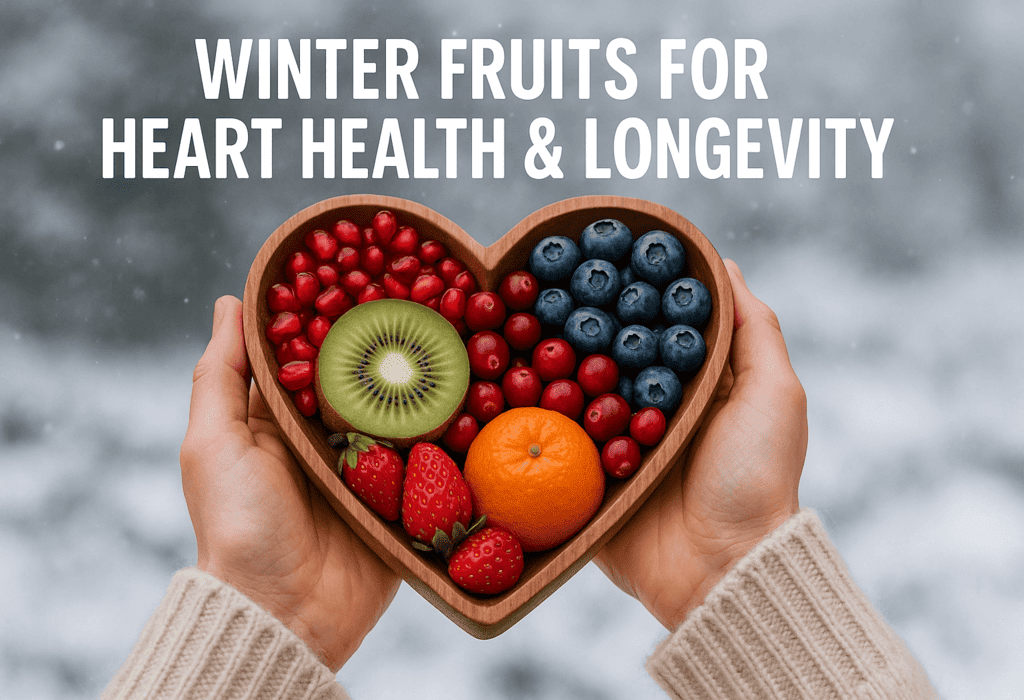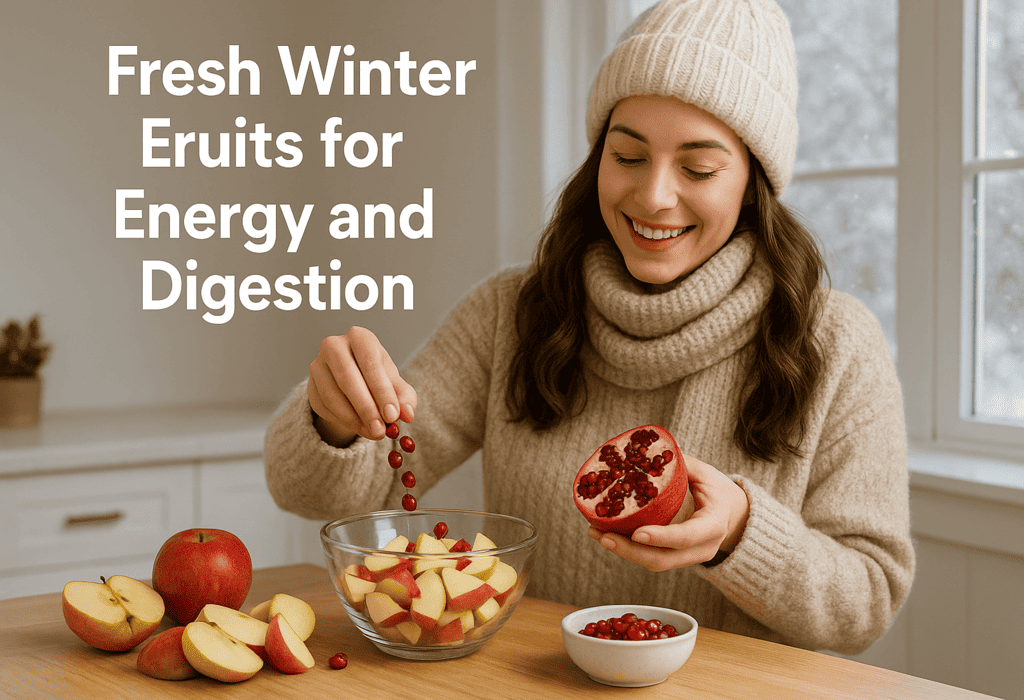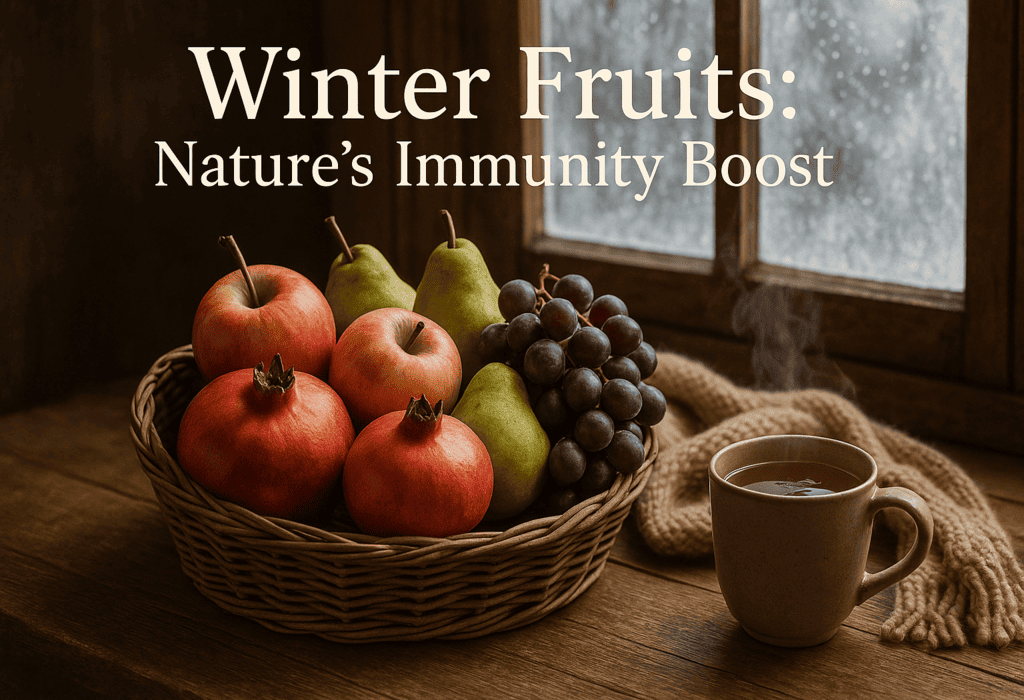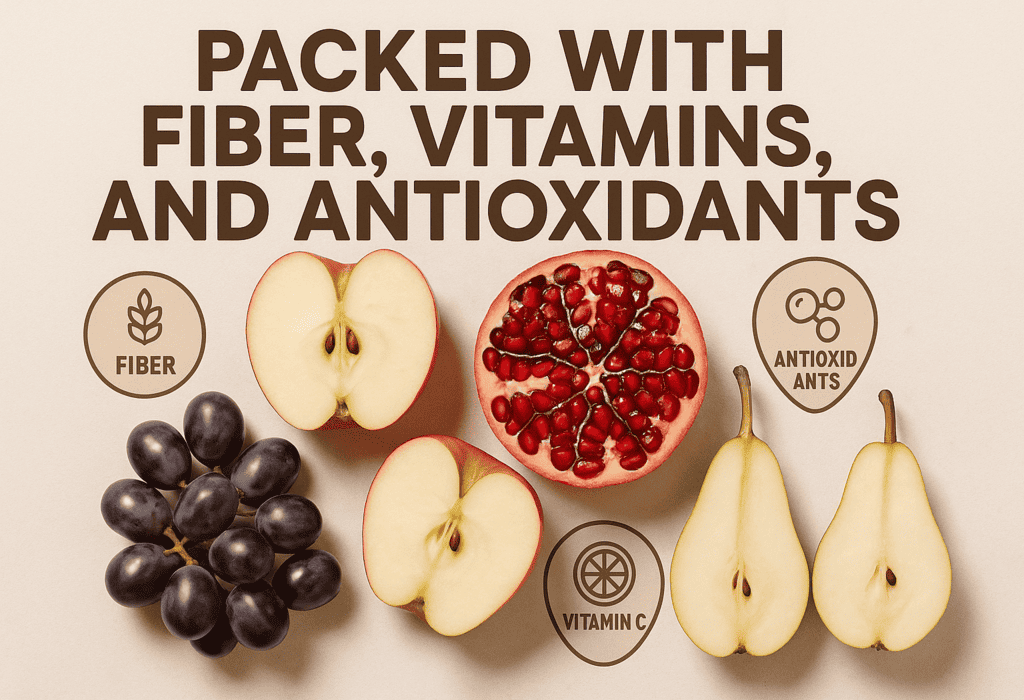
Introduction
Winter fruits — such as apples, pears, pomegranates, grapes, and citrus varieties — are seasonal powerhouses loaded with vitamins, antioxidants, and dietary fiber. Eating these fruits regularly supports a strong immune system, steady energy levels, healthy digestion, and long-term protection against chronic diseases. This article reviews the latest scientific findings from leading researchers in Asia, Europe, and North America, summarizes the key benefits of winter fruits, and provides SEO-friendly guidance you can use to improve health through seasonal eating.
Key Points
- Winter fruits are rich sources of vitamin C, polyphenols, and dietary fiber — nutrients that support immunity, reduce inflammation, and improve digestion. PMC+1
- Regular consumption of whole fruits such as apples and pomegranates is associated with improved cardiovascular outcomes and better glycemic control. PubMed+1
- Bioactive compounds in grapes (e.g., resveratrol) and pomegranate (e.g., ellagitannins) provide antioxidant and anti-inflammatory effects that support vascular and metabolic health. PMC+1
- Increasing dietary fiber from fruits helps regulate blood glucose and supports a healthy gut microbiome. PMC+1

Body
Why winter fruits matter : nutrients and mechanisms
Winter fruits contain concentrated levels of nutrients that are especially useful during colder months when infections and lower physical activity are more common. Vitamin C supports immune cell function and antioxidant defenses; polyphenols (flavonoids, anthocyanins, ellagitannins) counter oxidative stress and inflammation; and dietary fiber supports digestion and glycemic control. Comprehensive reviews of vitamin C and dietary fiber highlight their broad roles in immune health and chronic-disease prevention. PMC+1
Practical takeaway : Include at least one serving (about 80–150 g) of winter fruit daily to support immunity and digestion.
Evidence from recent clinical and observational studies
Researchers across continents have examined the health effects of fruit consumption and the bioactive compounds within winter fruits:
- Pomegranate : Contemporary reviews led by teams including Wang et al. summarize antioxidant, anti-inflammatory, hypoglycemic, and cardiometabolic benefits of pomegranate seeds and juice. Clinical meta-analyses show pomegranate products can reduce fasting blood glucose and improve insulin sensitivity in adults, especially in patients with type 2 diabetes. PMC+1
- Apples : Systematic reviews and cohort studies find that regular apple consumption is associated with lower cardiovascular risk and mortality in several populations. A large meta-analysis and newer observational data indicate that eating apples 3–4 times per week correlates with reduced risk of cardiovascular and cerebrovascular death in people with dyslipidemia. PubMed+1
- Grapes and resveratrol : Reviews of clinical trials show that resveratrol, a polyphenol abundant in grapes, can benefit endothelial function and markers of vascular health; ongoing trials evaluate optimal doses and long-term benefits. PMC+1
These studies include authors and teams from Asia (e.g., investigators publishing on pomegranate metabolism and glycemic outcomes), Europe (reviews on resveratrol and vascular health), and North America (large observational cohorts and nutrition reviews), reflecting a global evidence base. PMC+2PMC+2

Nutrient table: winter fruits at a glance
| Fruit | Typical serving (100 g) | Key nutrients | Notable health impact |
|---|---|---|---|
| Apple | 52 kcal; 2.4 g fiber | Vitamin C, polyphenols (quercetin) | Supports heart health, reduces inflammation. PMC+1 |
| Pear | 57 kcal; 3.1 g fiber | Vitamin C, potassium, fiber | Promotes gut motility and satiety. PMC |
| Pomegranate | 83 kcal; ~4.0 g fiber | Ellagitannins, vitamin C, potassium | Antioxidant, may improve glycemic markers. PMC+1 |
| Grapes | 69 kcal; 0.9 g fiber | Resveratrol, vitamin C | Vascular protection and antioxidant effects. PMC |
Figure note: fiber values and nutrient highlights are drawn from recent nutritional reviews and peer-reviewed articles. MDPI+1
How winter fruits support immunity
Vitamin C and fruit polyphenols enhance innate and adaptive immune responses by supporting white blood cell function and reducing oxidative damage. A scoping review of vitamin C evidence emphasizes its role across multiple health outcomes and supports dietary recommendations for adequate intake from foods, including fruits. Meanwhile, fruit polyphenols modulate inflammatory signaling and can improve immune resilience against infections. PMC+1
Practical tip : Pair vitamin-C rich fruits (e.g., pomegranate arils, slices of citrus) with meals to improve antioxidant coverage and enhance iron absorption from plant sources.
Metabolic and cardiovascular benefits
Multiple meta-analyses and systematic reviews report that whole-fruit consumption — especially fruits high in fiber and polyphenols — is associated with improved blood lipid profiles, lower blood pressure, and better glycemic control. Soluble fibers (pectin, found in apples and pears) slow glucose absorption and aid weight management, while polyphenols (in pomegranate and grapes) favourably affect endothelial function. ScienceDirect+1
Actionable advice : For cardiometabolic benefits, consume whole fruits rather than fruit juices to retain fiber and minimize rapid sugar absorption.

Gut health and dietary fiber
Dietary fiber from winter fruits feeds beneficial gut bacteria, supports stool regularity, and reduces constipation. Recent systematic reviews show increased dietary fiber intake improves glycemic control in people with or at risk for type 2 diabetes and supports weight management. Fruit-derived fibers such as pectin and insoluble cellulose both contribute to a healthy microbiome. PMC+1
Simple swap : Replace processed snacks with a whole apple or pear to add fiber, reduce calorie density of the diet, and stabilize blood sugar.
Safety, portions, and practical recipes
Winter fruits are safe for most people and can be integrated into every meal:
- Breakfast: Yogurt parfait with pomegranate seeds and sliced apple.
- Snacks: Fresh pear or a small bunch of grapes.
- Dessert: Baked apple with cinnamon (minimal added sugar).
People with diabetes should monitor portions and prioritize whole fruits over concentrated juices. Those on certain medications (e.g., some blood-pressure drugs or statins) should consult a clinician for interactions (rare but possible with concentrated fruit extracts).
Conclusion
Winter fruits are accessible, delicious, and scientifically proven allies for health. They supply vitamin C, dietary fiber, and bioactive polyphenols that improve immune function, support cardiometabolic health, and nurture a healthy gut microbiome. Global research — from teams in Asia, Europe, and North America — consistently supports the recommendation to eat whole, seasonal fruits regularly as part of a balanced diet. Aim for at least one serving of winter fruit daily, and combine them with vegetables, whole grains, and lean proteins for optimal health.
Selected Recent Studies and References
(Representative, peer-reviewed and high-quality sources cited in the text.)
- Wang J., et al. Pomegranate seeds: a comprehensive review of traditional and modern research. (2024). PMC article summarizing antioxidant, anti-inflammatory, hypoglycemic effects. PMC
- Mohammadzaheri F., et al. The effect of pomegranate products on glycemic profile in adults: systematic review and meta-analysis. (2025). Shows reductions in fasting glucose and HOMA-IR. PMC
- Sun C., et al. The influence of different forms of apple products on health outcomes. (2025). Review on apples and reductions in cardiometabolic risk. PMC
- Zhu X., et al. Apple intake and cardiovascular disease risk: systematic review and meta-analysis. (2021). Links apple consumption to lower CVD risk. PubMed
- Godos J., et al. Resveratrol and vascular health: evidence from clinical trials. (2024). Review of resveratrol’s effects on endothelial function. PMC
- Lykkesfeldt J., et al. Vitamin C — a scoping review for Nordic Nutrition Recommendations (2023). Comprehensive review of vitamin C and health outcomes. PMC
- Nitzke D., et al. Increasing dietary fiber intake for T2DM: systematic review (2024). Fiber improves glycemic control. PMC
- Abdi S.A.H., et al. Effects of dietary fiber interventions on glycemic control and weight management (2025). Systematic review/meta-analysis. PMC
- Healthline. 10 Health Benefits of Pomegranate. (2024). Consumer-facing summary of research. Healthline
- WebMD / Mayo Clinic / Harvard Health pieces summarizing fruit benefits and practical nutrition guidance. Harvard Health+1





